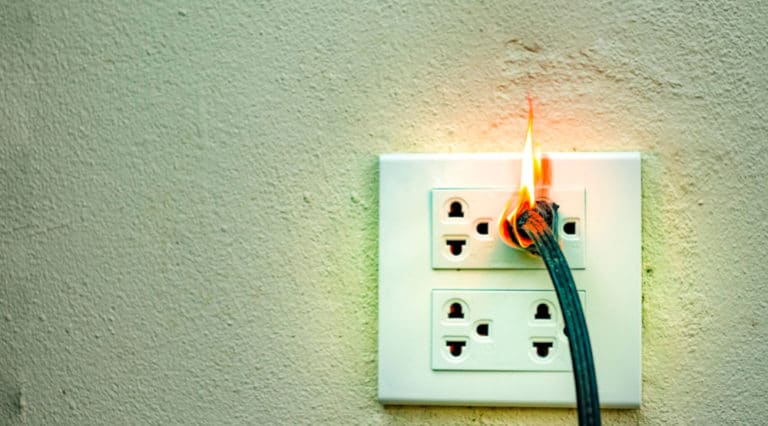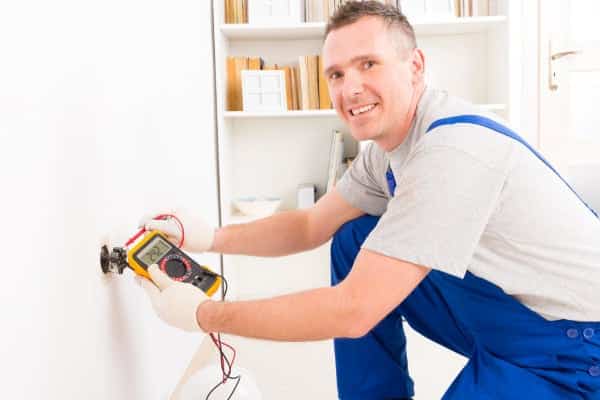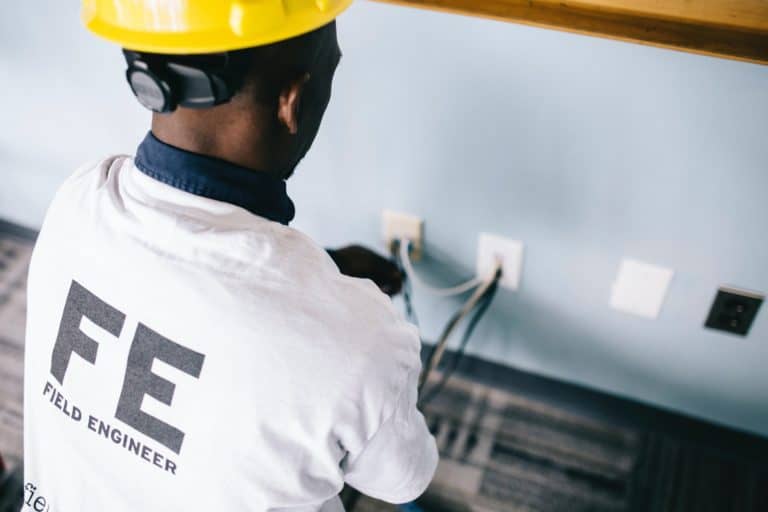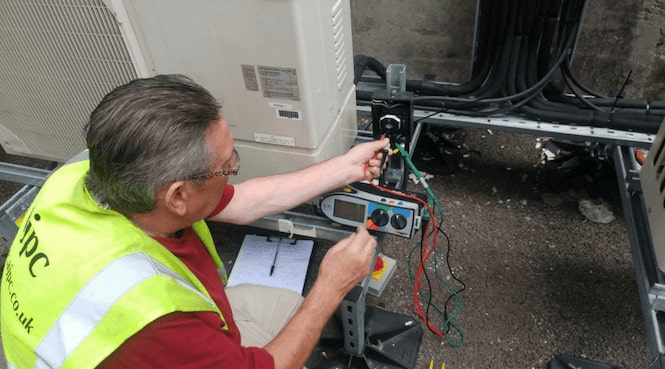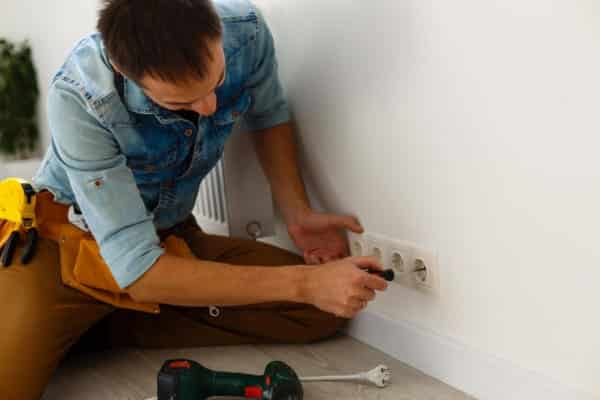Find My Local Expert Top 7 Causes of Electrical Fires...
Read More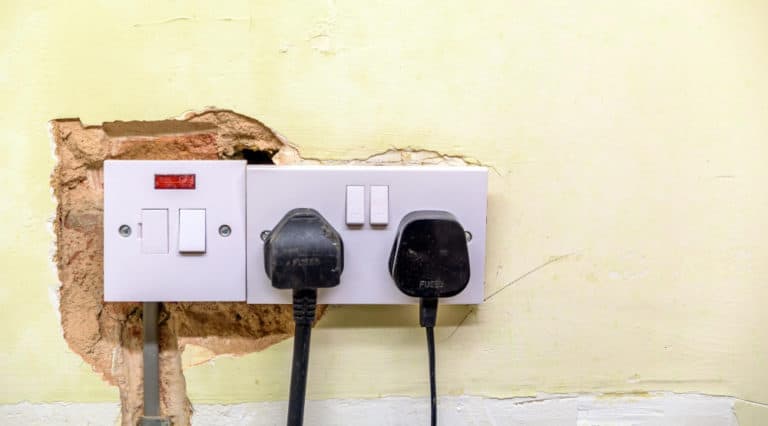
Can a Broken Outlet Cause a Fire?
Most homeowners are aware of the prospect of an electrical fire, and how dangerous these fires can be even compared to a non-electrical fire. But not all homeowners are as sure about how these kinds of fires get started. An obvious cause might be something like a live wire being severed near something flammable, or an appliance being accidentally broken while switched on. But what about broken outlets?
A broken electrical outlet can certainly cause a fire, and, depending on the way in which it is broken, it doesn’t necessarily need to be in use to do so.
Most of the problems with broken electrical outlets stem from poor connections in the electrical circuit, whether it be between the outlet and the appliance that is being plugged into it, or between the outlet and the wires that feed it electricity. When the connection is poor, it can cause problems where the electricity “sparks”. We’ll get into a little more detail about this process below, but for now, all you need to know is that these sparks are very hot, and if they land on something flammable before they have cooled down, they could cause that flammable thing to catch fire.
Granted, for an outlet set into a concrete or stone wall, this shouldn’t be an issue, but many internal walls are stud, meaning they are made of wood. They may even have flammable insulation inside. And, of course, there is the possibility that the poor connection manifests on the outside of the socket, where there is carpet and furniture and wallpaper to contend with.
So, yes, a faulty electrical outlet can certainly start a fire. Will it definitely start a fire? No. There are a myriad of ways an electrical outlet can be faulty, and not all of them are as likely to cause a fire. And, of course, there is the matter of circumstance—an outlet that is not near anything flammable is unlikely to be able to start a fire. At least not one that will last very long (there are flammable materials in the outlets themselves).
What does a Broken Outlet Look Like?
Herein lies the tricky part. A broken outlet does not necessarily have to look like anything. Sure, there could be cracked casings, or the holding mechanism could have failed, and the plugs keep falling out—these are clear signs that there is a problem, and they certainly should be dealt with. But the kinds of problems that can start an electrical fire can also be entirely hidden from view.

In fact, an electrical outlet that has visible damage could function perfectly fine if the damage does not extend to anywhere where the contacts and wiring are, whereas an outlet that looks perfectly fine on the outside could be a crackling fire waiting to happen on the inside!
Now, we’re not for a second suggesting that you should leave a visibly broken socket without getting it fixed, even if the damage is unlikely to be causing a potential fire hazard. Just be aware that the problems with a broken electrical outlet are not always obviously visible.
Signs of a Broken Outlet
The most obvious sign of a problem with your electrical outlet is visible damage on the outside, not least because if there is significant damage to the outside of the outlet, there was probably an incident that causes said damage, meaning you’re more likely to be aware of it. Damage like this might include cracks to the casing, pieces of the casing missing, the outlet itself not being securely fastened to the wall, and the outlet not securely holding plugs in place.
Visible Damage to the Outlet
The most obvious sign of a problem with your electrical outlet is visible damage on the outside, not least because if there is significant damage to the outside of the outlet, there was probably an incident that causes said damage, meaning you’re more likely to be aware of it.
Damage like this might include cracks to the casing, pieces of the casing missing, the outlet itself not being securely fastened to the wall, and the outlet not securely holding plugs in place.
Noises Coming from the Outlet
Electricity in the amount that is used in a typical domestic home or business should never make noise (not counting the sound of the appliance working). At least, nothing that a human ear can pick up.
If you can hear a crackling, humming, or really any kind of noise from your electrical outlets, whether they are in use or not, that is a bad sign, and you should get it looked at as soon as possible.
Scorch Marks
Perhaps the most obvious sign that your outlet is not only broken but also a fire hazard is scorch marks around the casing. These will usually be around the points where the plug’s prongs slide into the outlet. Needless to say, they shouldn’t be there, and you certainly shouldn’t use that outlet again until the problem has been dealt with.
What is Behind a Broken Outlet?
Broken outlets can come about for several reasons. There is obvious—physical damage caused by some accident. It can also happen from deterioration over time, though that should be extremely rare and only a problem in wiring and outlets that are very old. There is also the possibility of inexpertly installed outlets. In the case of the latter, those outlets may have worked fine for years. In all cases, the problem is one of electrical capacity.
When electricity passes through something, there is a certain amount of resistance. The less resistance, the more freely the electricity can pass through that medium. But when there is a lot of resistance, the electricity’s passing generates heat. This is used in a controlled manner in filament-based light bulbs, which pass electricity through a filament that offers so much resistance that it glows white-hot, generating light.
This is done so inside a glass bulb that contains no air, so there is no risk of fire.
Unfortunately, the same thing can happen in other situations, such as if the connection between an electrical wire and an outlet is not secure. The less wire that is in contact with the outlet’s terminals, the less capacity it has to transfer electricity without resistance. If this connection is small enough, it can generate enough heat to start melting the surrounding components and possibly causing a fire.
How Can a Broken Outlet Cause a Fire?
In some cases, the heat generated from a poor connection alone could be enough to start a fire, but it doesn’t need to be. Poor connections have a habit of sparking, which is where electricity, seeking the path of the least resistance, arcs through the air. If a spark like this passes close enough to anything flammable, it could catch fire.
Another possibility is that the wires or terminals themselves get hot enough to melt, and the bits of the melted copper or other conductive materials fall away and land on something flammable.
What Should I do if I Have a Broken Outlet?
The first thing you should do is absolutely not use that outlet until the problem has been resolved. Disconnect any appliances immediately. You should also cut the power at the fuse board to ensure that any unseen problems can’t cause a fire while you wait to get the problem resolved. Unfortunately, this will probably mean cutting the power to other parts of your home, since the outlet will almost certainly be on a circuit with many other outlets in your home.
Still, most people would consider losing power in some or all of your electrical outlets temporarily to be better than an electrical fire in your home!
Should I Replace It?
Whether the outlet should be replaced mainly comes down to the cause of the problem. If there is physical damage to the outlet, then yes, there is no doubt about whether it should be replaced. Similarly, if the outlet is just very old and deteriorated, replacing it should be a given.
However, if the problem was something like the electrical connection not being secure—possibly due to improper installation—then it may be the case that all it needs is the wires securing in place. You may need to get an expert to cast their eye over the problem before you can choose the necessary course of action here.
That being said, it certainly won’t make things worse if you replace the outlet (assuming the new one is installed correctly) so you could just choose to do it anyway.
Final Thoughts
Unfortunately, the more common causes of a broken electrical outlet causing a fire are unseen right up until the fire. Unless you plan to periodically do rounds of your property pulling outlets off of the wall to check, your best bet to ensure a problem like this doesn’t sneak up on you is to get your house checked over by an electrician from time to time.
Qualified electricians have the expertise and the tools to identify problems like this far more quickly and less invasive than a regular homeowner can. Don’t wait until there’s a fire!
You May Also Like...
Securing a Loose Electrical Outlet
Find My Local Expert Securing a loose electrical outlet Most...
Read MoreHow To Safely Identify Electrical Faults in Your Home
Find My Local Expert How To Safely Identify Electrical Faults...
Read MoreElectrical Installation Condition Report
Find My Local Expert Everything You Need to Know About...
Read MoreDo I Need an Electrician to Move an Electrical Outlet?
Find My Local Expert Do I Need an Electrician to...
Read MoreGot a Broken Outlet?
My Trusted Expert Guarantee
Experts Have Been Vetted & Approved
